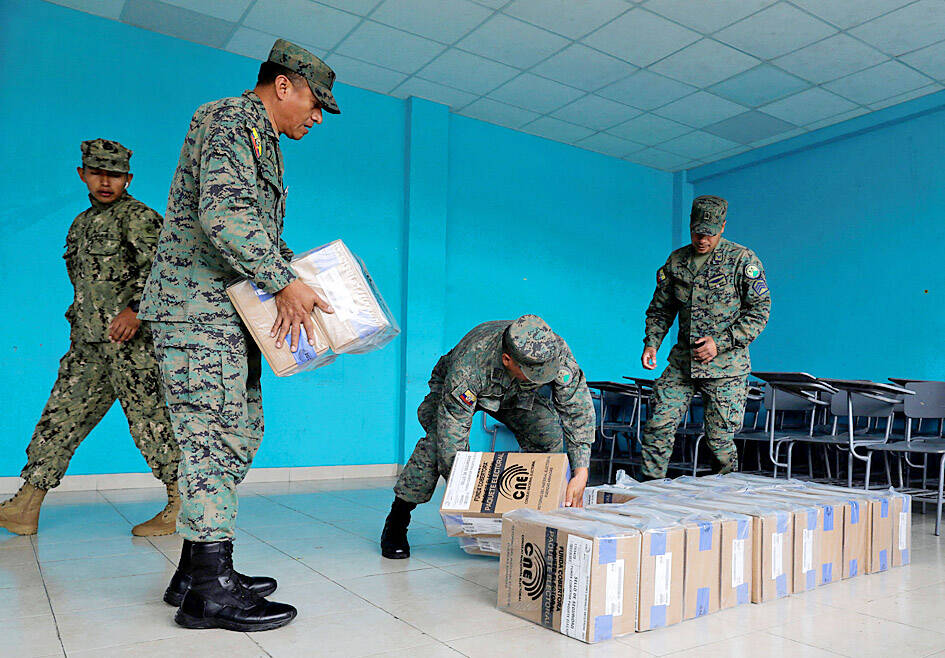Ecuadorans were yesterday to vote for a new president in the midst of a bloody drug war and a rash of political assassinations that cut short the bid of a popular candidate.
The remaining finalists — lawyer Luisa Gonzalez, 45, and banana empire heir Daniel Noboa, 35 — campaigned in bullet-proof vests as a climate of fear grips the once-peaceful country. Both have vowed to prioritize the escalating violence.
According to recent polls, the main concern of Ecuadorans is crime and insecurity in a country where the murder rate has quadrupled in the four years to last year. About 54,000 police were to be deployed to keep the vote safe.

Photo: Reuters
Long a haven between major cocaine exporters Colombia and Peru, violence in the South American nation has exploded in the past few years as enemy gangs with links to Mexican and Colombian cartels vie for control.
The fighting has seen at least 460 inmates massacred in prison since February 2021 — many beheaded or burned alive in mass riots. The bloodbath has also spilled into the streets, with gangs dangling headless corpses from city bridges and detonating car bombs outside police stations in a show of force.
About 3,600 Ecuadorans have been murdered so far this year, including nearly a dozen politicians, the Ecuadoran Organized Crime Observatory says.
In August, the violence claimed the life of anti-graft and anti-cartel journalist and presidential candidate Fernando Villavicencio, mowed down in a barrage of submachine gun fire after a campaign speech. He had been polling in second place.
A state of emergency was declared after Villavicencio’s assassination, and Noboa and Gonzalez campaigned with heavy security details.
Reporters following them have also had to don protective jackets and helmets and travel in armored vehicles. Many have received death threats.
Seven suspects in Villavicencio’s assassination were killed in prison.
Whoever wins this vote would be elected to only 16 months in office — completing the term of Ecuadoran President Guillermo Lasso who called a snap vote to avoid possible impeachment for alleged embezzlement.
They would be allowed to run again for the 2025-2029 presidential term and the one after that.
Both relative unknowns, a win for either candidate would make history: Gonzalez becoming Ecuador’s first woman president, or Noboa its youngest.
Gonzalez is the handpicked candidate of former Ecuadoran president Rafael Correa, a socialist who governed from 2007 to 2017 and lives in exile in Belgium to avoid serving an eight-year prison term for graft.
Noboa, is the son of one of Ecuador’s richest men who himself has five failed presidential bids behind his name.
Voting is compulsory for 13.4 million eligible voters in the country of 16.9 million.

The death of a former head of China’s one-child policy has been met not by tributes, but by castigation of the abandoned policy on social media this week. State media praised Peng Peiyun (彭珮雲), former head of China’s National Family Planning Commission from 1988 to 1998, as “an outstanding leader” in her work related to women and children. The reaction on Chinese social media to Peng’s death in Beijing on Sunday, just shy of her 96th birthday, was less positive. “Those children who were lost, naked, are waiting for you over there” in the afterlife, one person posted on China’s Sina Weibo platform. China’s

‘POLITICAL LOYALTY’: The move breaks with decades of precedent among US administrations, which have tended to leave career ambassadors in their posts US President Donald Trump’s administration has ordered dozens of US ambassadors to step down, people familiar with the matter said, a precedent-breaking recall that would leave embassies abroad without US Senate-confirmed leadership. The envoys, career diplomats who were almost all named to their jobs under former US president Joe Biden, were told over the phone in the past few days they needed to depart in the next few weeks, the people said. They would not be fired, but finding new roles would be a challenge given that many are far along in their careers and opportunities for senior diplomats can

Australian Prime Minister Anthony Albanese yesterday announced plans for a national bravery award to recognize civilians and first responders who confronted “the worst of evil” during an anti-Semitic terror attack that left 15 dead and has cast a heavy shadow over the nation’s holiday season. Albanese said he plans to establish a special honors system for those who placed themselves in harm’s way to help during the attack on a beachside Hanukkah celebration, like Ahmed al-Ahmed, a Syrian-Australian Muslim who disarmed one of the assailants before being wounded himself. Sajid Akram, who was killed by police during the Dec. 14 attack, and

RUSHED: The US pushed for the October deal to be ready for a ceremony with Trump, but sometimes it takes time to create an agreement that can hold, a Thai official said Defense officials from Thailand and Cambodia are to meet tomorrow to discuss the possibility of resuming a ceasefire between the two countries, Thailand’s top diplomat said yesterday, as border fighting entered a third week. A ceasefire agreement in October was rushed to ensure it could be witnessed by US President Donald Trump and lacked sufficient details to ensure the deal to end the armed conflict would hold, Thai Minister of Foreign Affairs Sihasak Phuangketkeow said after an ASEAN foreign ministers’ meeting in Kuala Lumpur. The two countries agreed to hold talks using their General Border Committee, an established bilateral mechanism, with Thailand